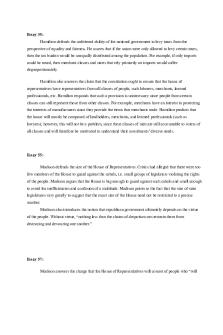Federalist papers essays 35,55,57 PDF

| Title | Federalist papers essays 35,55,57 |
|---|---|
| Course | Fundamental Concepts of Politics |
| Institution | Boston College |
| Pages | 2 |
| File Size | 52.6 KB |
| File Type | |
| Total Downloads | 11 |
| Total Views | 171 |
Summary
notes for political science book "The Federalist Papers"...
Description
Essay 35: Hamilton defends the unfettered ability of the national government to levy taxes from the perspective of equality and fairness. He asserts that if the union were only allowed to levy certain taxes, then the tax burden would be unequally distributed among the population. For example, if only imports could be taxed, then merchant classes and states that rely primarily on imports would suffer disproportionately. Hamilton also answers the claim that the constitution ought to ensure that the house of representatives have representatives from all classes of people, such laborers, merchants, learned professionals, etc. Hamilton responds that such a provision is unnecessary since people from certain classes can still represent those from other classes. For example, merchants have an interest in protecting the interests of manufacturers since they provide the items that merchants trade. Hamilton predicts that the house will mostly be composed of landholders, merchants, and learned professionals (such as lawyers); however, this will not be a problem, since these classes of men are still accountable to voters of all classes and will therefore be motivated to understand their constituents’ diverse needs.
Essay 55: Madison defends the size of the House of Representatives. Critics had alleged that there were too few members of the House to guard against the cabals, i.e. small groups of legislators violating the rights of the people. Madison argues that the House is big enough to guard against such cabals and small enough to avoid the inefficiencies and confusion of a multitude. Madison points to the fact that the size of state legislatures vary greatly to suggest that the exact size of the House need not be restricted to a precise number. Madison also introduces the notion that republican government ultimately depends on the virtue of the people. Without virtue, “nothing less than the chains of despotism can restrain them from destroying and devouring one another.”
Essay 57: Madison answers the charge that the House of Representatives will consist of people who “will
have least sympathy with the mass of the people; and be most likely to aim at an ambitious sacrifice of the many, to the aggrandizement of the few.” Madison points out that the electors of the representatives will not be confined to certain segments of the population, but will consist of “the great body of the people of the United States.” Madison then outlines several reasons for why the representatives will remain faithful to the interests of the American people. He argues that a sense of duty, gratitude, interest, and ambition will ensure that the representatives serve the people well. In particular, he notes that the representatives owe their distinguished position to the people and, especially due to the frequency of elections, will be motivated to retain their support. If they want to stay in power, the representatives must behave properly in the eyes of the people....
Similar Free PDFs

APUSH The Federalist Papers
- 1 Pages

Federalist Papers No. 78
- 3 Pages

Federalist vs. Anti-Federalist
- 2 Pages

Federalist 70Graphic Organizer
- 4 Pages

Federalist pper copy
- 9 Pages

Federalist paper number 10
- 1 Pages

Federalist #10 - homework
- 2 Pages

Federalist No.51 (1788)
- 8 Pages
Popular Institutions
- Tinajero National High School - Annex
- Politeknik Caltex Riau
- Yokohama City University
- SGT University
- University of Al-Qadisiyah
- Divine Word College of Vigan
- Techniek College Rotterdam
- Universidade de Santiago
- Universiti Teknologi MARA Cawangan Johor Kampus Pasir Gudang
- Poltekkes Kemenkes Yogyakarta
- Baguio City National High School
- Colegio san marcos
- preparatoria uno
- Centro de Bachillerato Tecnológico Industrial y de Servicios No. 107
- Dalian Maritime University
- Quang Trung Secondary School
- Colegio Tecnológico en Informática
- Corporación Regional de Educación Superior
- Grupo CEDVA
- Dar Al Uloom University
- Centro de Estudios Preuniversitarios de la Universidad Nacional de Ingeniería
- 上智大学
- Aakash International School, Nuna Majara
- San Felipe Neri Catholic School
- Kang Chiao International School - New Taipei City
- Misamis Occidental National High School
- Institución Educativa Escuela Normal Juan Ladrilleros
- Kolehiyo ng Pantukan
- Batanes State College
- Instituto Continental
- Sekolah Menengah Kejuruan Kesehatan Kaltara (Tarakan)
- Colegio de La Inmaculada Concepcion - Cebu







